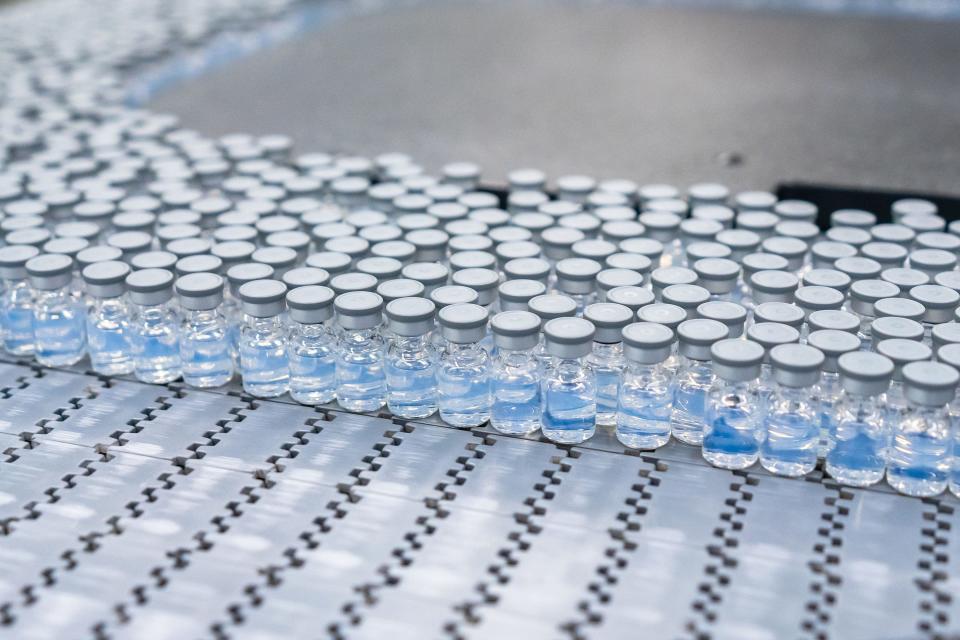FDA authorizes new COVID-19 booster shot to target omicron variant. What you need to know
- Oops!Something went wrong.Please try again later.
The U.S. Food and Drug Administration on Wednesday gave emergency use authorization to COVID-19 booster shots that have both the original formula of the mRNA vaccines that were based on the original 2019 coronavirus strain and an added component that addresses the BA.4 and BA.5 variants of omicron. Those are the variants that have been widely circulating this summer.
The U.S. Centers for Disease Control and Prevention's vaccine advisory committee is scheduled to meet Thursday to vote on the updated boosters. Then the CDC director needs to sign off on these boosters before people can begin to receive them.
How will the new omicron booster be used?
The bivalent boosters, as the FDA calls the updated boosters, will replace the original vaccines as a booster. They will not replace the original vaccine for the initial two doses in the primary series.
Up until this point, people ages 5 and older could get a booster five months after completing their primary series of the vaccine. Then four months after a booster, people ages 50 years old and older could get a second booster.
This new updated booster can be given to people two months after their primary series or their last booster. It is thought that would include anyone ages 12 and older, but doctors are awaiting specific recommendations from the CDC. Those recommendations should come Friday or early next week.
The Pfizer updated booster is for people ages 12 and older. The Moderna booster is for people ages 18 and older. Kids 12 and younger will have to wait for this booster to be approved for their age group. The FDA has said that approval could come in the next few months.
Fighting two diseases:COVID-19 and monkeypox latest local numbers
Why a different COVID booster shot?
The original COVID-19 vaccines were based on the original strain of COVID-19. With each variant, the effectiveness of the vaccine against infection has waned, medical experts say.
These updated boosters "are really meant to match in a better way the virus that's circulating," said Dr. Manish Naik, chief medical officer of Austin Regional Clinic.
COVID-19 is still circulating; Naik said, about 20% of the tests at Austin Regional Clinic are coming back positive. Other respiratory viruses are circulating as well.
Travis and Williamson counties are at a low level of COVID-19 spread, and Hays, Caldwell and Bastrop counties have a high level of spread. Some schools are starting to see an uptick in cases with the new school year.
COVID-19 and schools:A different year ahead than 2021, 2020
What about the studies on this COVID booster shot?
Unlike the initial vaccines that were tested in tens of thousands of people before being giving emergency use authorization, these boosters were tested in labs. A study of a booster with the BA.1 omicron was studied on people in the United Kingdom.
Dr. Kristin Mondy, chief of the division of infectious diseases at the University of Texas Dell Medical School, said large-scale testing on people wasn't necessary because the safety of the vaccines have been proven by the millions of people who received the original versions. That level of testing, "we don't do that with any updated vaccine," she said.

Do you need this omicron booster?
Naik compares the new vaccines to vaccines for the flu. Some years the flu vaccine is a good match against the flu strain that's circulating, other years it's not as good a match. "It's still effective against hospitalization and dying even if it's a mismatch," Naik said.
This booster will have a spike protein to recognize the original COVID-19 as well as a spike protein to recognize the BA.4 and BA.5 omicron variants.
"There is value in boosting antibody response," Naik said.
Vaccines and boosters "do help prevent the spread," Mondy said. "We could always see COVID-19 mutate in other ways."
If you have been boosted, you are less likely to have a high-viral replication, she said, which makes you less likely to give the disease to other people.
Emerging data also has shown that people who have kept up with boosting are less likely to have severe disease and less likely to have the lingering "long COVID," Mondy said.
If I've already had omicron, do I need this booster shot?
What isn't clear from the data is how long immunity lasts after having a natural infection. Mondy is hoping there will be more research into when a person who had a natural infection needs to get an updated booster. Is it two months, like it is with a booster or regular vaccine? Or is it longer?
Naik said the hope is that question will be answered by the CDC in its recommendations.
When will these boosters hit the pharmacies?
Austin Regional Clinic already has put in its order. Typically, the vaccines will show up within a few weeks of the CDC approval, Naik said. The operational processes and electronic systems also have to be put in place to make sure the right people are getting the booster, he said.
CVS has said as soon as the CDC signs off on it and the federal government releases the supply, it will be ready. "We expect our pharmacies to begin to receive supply on a rolling basis over the next few days and appointments will be made available at CVS.com," CVS said in a written statement. Expect the same at other pharmacies.
This article originally appeared on Austin American-Statesman: FDA authorizes new COVID-19 boosters with omicron variant. What you need to know

